Shooting a feature in Iraq against all odds, Al Daradji on Ahlaam
Leeds filmmaker faced kidnap, torture and attacks to shoot debut feature in Iraq - now on cinema release in the UK
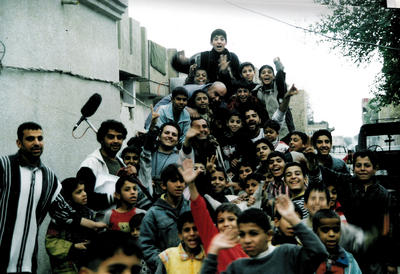 There are tales of filmmakers acting
like war heroes, battling against the odds to complete their film true
to their vision. There's Francis Ford Copolla in Hearts of Darkness: A
Filmmakers Apocalypse clinging onto a helicopter as it took off to
go fight in Cambodia, the whole journey of production on that film a
kind of brute heroism. Tales of crew dying on Werner Herzog's
Fitzcaraldo suggest that powerful cinema was a battle against the
forces of nature, while Kubricks long time obsession with Napoleon, seem to be a reflection of the film director as war general, invading one
reality, and imposing another on top.In the beginning they were calling me 'Mohammed the crazy' because if you
want to make a film in the war zone it is not acceptable. People are
scared, they want to protect themselves, how can you go in the middle
of the street, making films?
There are tales of filmmakers acting
like war heroes, battling against the odds to complete their film true
to their vision. There's Francis Ford Copolla in Hearts of Darkness: A
Filmmakers Apocalypse clinging onto a helicopter as it took off to
go fight in Cambodia, the whole journey of production on that film a
kind of brute heroism. Tales of crew dying on Werner Herzog's
Fitzcaraldo suggest that powerful cinema was a battle against the
forces of nature, while Kubricks long time obsession with Napoleon, seem to be a reflection of the film director as war general, invading one
reality, and imposing another on top.In the beginning they were calling me 'Mohammed the crazy' because if you
want to make a film in the war zone it is not acceptable. People are
scared, they want to protect themselves, how can you go in the middle
of the street, making films?
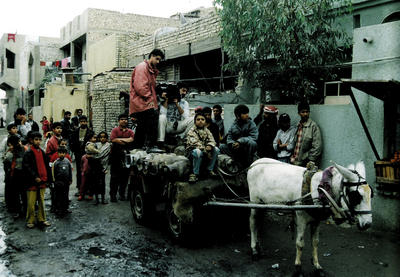 But none of these people come
close, in terms of gung ho guerilla filmmaking guts, to Mohammed Al Daradji, whos Ahlaam is currently on release in the UK. Not
content to shoot a film about Iraq while the war still waged, Al
Daradji returned to the country to shoot it there. He dressed extras up
as Saddam's Bathist thugs and rehung photos of Saddam to create
flashback scenes. He recreated battles on the streets of Iraq with
soldiers and burning cars (see right), while real battles raged streets away. And
in doing so he shot the country's first feature in over a decade, using
a largely untrained local cast and crew, some of whom had been imprisoned
under the Saddam regime. The team were shot at and threatened so many
times that Daradji took to holding a machine gun in one arm and his
camera in the other. His sound recordist was shot in both legs, and he
and the crew were kidnapped first by the insurgents, accusing them of
making a pro-USA film, and then the Americans, accusing them of making
a pro-Al Qaeda film.
But none of these people come
close, in terms of gung ho guerilla filmmaking guts, to Mohammed Al Daradji, whos Ahlaam is currently on release in the UK. Not
content to shoot a film about Iraq while the war still waged, Al
Daradji returned to the country to shoot it there. He dressed extras up
as Saddam's Bathist thugs and rehung photos of Saddam to create
flashback scenes. He recreated battles on the streets of Iraq with
soldiers and burning cars (see right), while real battles raged streets away. And
in doing so he shot the country's first feature in over a decade, using
a largely untrained local cast and crew, some of whom had been imprisoned
under the Saddam regime. The team were shot at and threatened so many
times that Daradji took to holding a machine gun in one arm and his
camera in the other. His sound recordist was shot in both legs, and he
and the crew were kidnapped first by the insurgents, accusing them of
making a pro-USA film, and then the Americans, accusing them of making
a pro-Al Qaeda film.
I've heard many stories of filmmaking against the odds - but none like this, while there are arguably few films right now as important as this one: a tale of Iraq during the conflict, shot during the conflict, with local actors and crew, filmed by a national, against all the odds. It doesn't take sides or try to prove a point. It just presents the human side of the story.
It's like the girl in the red dress in Schindlers List: in the midst of
the death tolls, chaos and photos of sandy devastation, it reminds
us that the people at the centre of this mess are really just like us;
with broken hearts, hopes for the future and unwanted hair loss. Do
anything you can to see this film, and show it to as many people as
possible. For me it is the reason why cinema is great - in a heart of
darkness it shows the light of the human.
Background
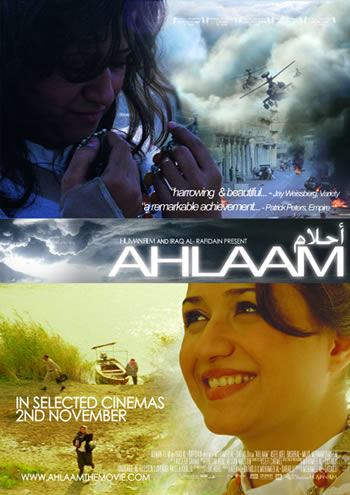
For me it was like 'to be or not to be'. During the two or three years of making Ahlaam, it was like for myself, what are you doing, who you are, what can you do?"The idea came from the BBC on the 10 O'Clock news. It was the beginnning of May, a couple of weeks after the fall of the Sadham regime. It was a reportage about a mental institution. And I saw Ahlaam, the main character, she was wearing a white dress, and she was speaking a nonsense language, and this image of the lady speaking a nonsense language wearing a white dress in an empty room, this stayed in my mind. And when I went to bed, I dreamt about Ahlaam. She was on the streets of Baghdad in the scene that you see at the end of the film. That's what I saw in my dream in 2003.
"I woke up and wrote down the idea, and then two weeks later when I finished my degree I went back to Iraq and I was looking for mental institutions. I visited an institution by accident becuse I told my friend I would help some of the mentally ill people who were on the street. It was chaos, there was no government or anything. When I helped one of them back to the instituion, I asked what had happened to them and he told me their story. And so I based the foundation of the story, 50% on what had happened with these people. And so 50% is a true story, 50% fiction. "
Full in-depth interview follows...
When did you first get interested in films?
As a child living under the Saddam regime and dictatorship I acted in some properganda theatre at my primary school. I was doing acting and performance, like giving the key of paradise to Iranian soldiers. This was propaganda from Iraq against the Iranians. And you were acting this out at school!
And at the same time I was very good with writing stories. And then I studied theatre, it was very powerful, and then when I got to Holland I studied film and media and photography and then graduated, and worked for two years for TV companies, and then I came to UK to do my masters degree in 2002-2003.
How long did it take to write the first script?
Oh the first script? When I started I was thinking about the next short film, because I was thinking it would be difficult and no-one would fund me. I started to write my first short film script in November -December. And then I wrote the second and third draft around February 2004 and then started to think more seriously about doing the feature film. I went back to Iraq in March 2004 looking for locations, doing some casting. And still the idea of doing a 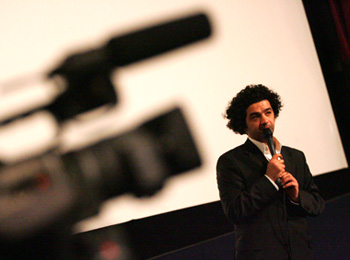 feature film developed more. Then I began in April 2004 to write my first draft of the feature film, until I finished the second draft around June / July.
feature film developed more. Then I began in April 2004 to write my first draft of the feature film, until I finished the second draft around June / July.
When I went back to Iraq to start pre-prpoduction I told the crew and cast 'I have two scripts - if we make the short film it means we can survive, we may have some money, we have food and maybe I can pay you. But if we make the feature film I can't pay you anything, there is no money at all'. And they were more intersted in the idea of future film.
So literally the first film you made was Ahlaam?
I made a short films during my studies in the UK - 4 mintue one take film, shot on 35mm, without any cuts.
When you went out to look for locations, was that the first time you'd been back since the fall of the regime?
I went in August 2003 to Iraq, after the fall of the regime. And in May I went back after George Bush called the end of the war. I spent there three months, up to Novemeber when I came back to the UK.
What was it like?
It was terrible. It was a shock. It was unacceptable. I'd left Iraq, Baghdad, and then came back and saw a destroyed city. My family were so affected from the war, all terrible. It was not easy.
To be honest with you it changed my life. Since I came back from Iraq, all my friend in college knew that I had been changed. It changed my life totally and showed me the reality there
At the time I was thinking what is war? War for me is madness. The
people invovled in a war are mad... You don't just destroy the number
of people killed, you change the culture, you change society, you bring
a new wave of disaster for the people. That's war.. Madness. Did you have family living in Iraq during the war?
(quiet) Yes, yes. Still at the moment.
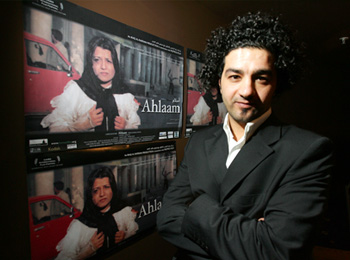 Was it at that point you decided you had to make this film?
Was it at that point you decided you had to make this film?
For me it was like who I am compared to what was going on and what am I doing now for my country, for my family, for my friends. I finished my degrees in the UK, what should I do for the country? How can I rebuild it back, to rebuild the mother country. For me it was like 'to be or not to be'. During the two or three years of making Ahlaam, it was like for myself, what are you doing, who you are, what can you do?
And we take the positive side from it and we made a film, and with making the film, it was for us to say that we exist as a nation.
For myself, for my cast, for any people we met, this film is not just about cinema, this film is about us, we exist as a nation and we want to bring our voice to a worldwide international audience.
The use of a story of the escaped mentally ill patients, mental health is very rarely dealt with sensitively in film - was that also an area you also wanted to explore?
At the time I was thinking what is war? War for me is madness. The people invovled in a war are mad, it is madness. When we think of war, it is not something easy. We think of bombing an area, bomb a city, bombing civilians, this is something huge, you destroy all the country, destroy buildings, all the culture. You don't just destroy the number of people killed, you change the culture, you change society, you bring a new wave of disaster for the people. That's war. That's war. It is not so easy to leave the environment of people at peace, after you've finished the war. So for me war is madness. So I was thinking ok, what about the madness with the mental institution people. Because these people can tell more powerful stories than other people.
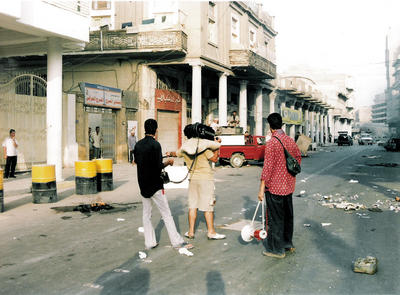 Did the story develop much from that point?
Did the story develop much from that point?
No of course there was much more processing. My style of making films is naturalistic, using non-profesisonal actors to tell the story, more than the normal way. And when you have non-professional actors you always try to work with them around the dialogue and the story, about the character. So I had the script, the dialogue but I tried to work with the actors to create modern dialogue. And the process of making the film changed a lot, during the production, and into post production. And this is maybe there in the performance of the actors, they seem more natural. We had non-professional actors, they were scared from the clapper board, they were scared from it, so always there was hiding and cheating to tell the actors we were doing actual rehearsals, but actually we were shooting it. But just my sound recorder and some of the team knew about that.
The main guy Sahid, he had never acted in his life. He had been
imprisoned under the Saddam regime, he'd been a political prisoner for
12 years. So I used his experience as a prisoner for the film.Where did you find the actors from?
From all over, from friends, and people who wanted to act. For example the main guy Sahid, he had never acted in his life. He had been imprisoned under the Saddam regime, he'd been a political prisoner for 12 years. So I used his experience as a prisoner for the film, I used his experience as a solider. I think 65% of the actors there were non-professional, you know.
How many were native to Iraq?
All of them were Iraqi, the crew and cast - all of them Iraqi.
What was the process like for them? I imagine it must have been cathartic but also stired things up.
It was something new, a new challenge for them, they liked it, they loved it. I mean none of my crew had experience of cinema or films. So it was like a kind of film school for them teaching them about the process of creating film. They found something they could send in a message. They were - we say in Arabic - thirsty to learn. Thirsty to learn anything, that was for them so exciting.
In the beginning they were calling me Mohammed the crazy because if you want to make a film in the war zone it is not acceptable. People are scared, they want to protect themselves, how can you go in the middle of the streeet, making films. So how could I convince them? And for me to convince them, is to be Iraqi, to stand for themselves, for their country. And we were pulling together like a national song - Ahlaam was about the future of Iraq, with us pulling together like the Iraqi way of singing. Just to encourage ourselves, otherwise it feels like you can't continue sometimes.
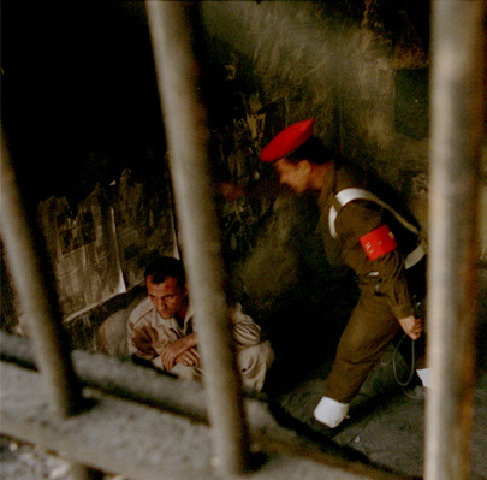 What made you to think it would be possible?
What made you to think it would be possible?
Well two things - how I loved films, how I love making films and telling stories. And then when I made the film, all the time when I was shooting, I could feel and sense how the audience would react to the film and the feedback from the audience. And from there I was thinking, making films in my nation, it always happens, with all the difficulty and the danger, we share it together. That's what kept me together and that's what left me thinking we can make this film and we can tell this story no matter how difficult it was for us.
There must have been a sense that just being a film crew in Iraq at that time, recording what was going on, makes whatever the film is about a historical document?
Absolutely, to be honest it will be told through generation after generation what we've been done, and what's happened. But to be honest we don't look at this. What we look at is that we were making a film, and it's not just a film, but it's a good film, with an artistic film with a message.
We were kidnapped by the insurgents who accused us of making films for
the Iraqian government and for the US army, and they shot my sound
recordist in both legs and they were beating us, and they were about to
shoot us.. Watching the film, I struggled to believe that some scenes were shot during the aftermath of the war, how did you pull it off?
Well that's down to the very good production team, I had very good fine art people, a great designer. We were so excited about this, putting things together. But we had danger too. Because to hang the image of Saddam Hussein in the streets of Baghdad at that time was not easy, in 2004, we had people around us and the police. People would come up to us and ask us why were were hanging a picture of Saddam. People thought we were insurgent. They would start fights with us, it was not easy, to be walking in the old army uniform of Saddam, and this was not easy. That's one of the problems we were facing.
Did you get hassle from both the Americans and the insurgents?
Yes me and my crew we were kidnapped by the insurgents who accused us of making films for the Iraqian government and for the US army, and they shot my sound recordist in both legs and they were beating us and they were about to shoot us but there was a sound of probably a police siren coming around the area where they were. And then they left us in the middle of the street, and we didn't see any police at the time. And we went to the hopsital, pleading danger and we told the hopsital officer what had happened with us.
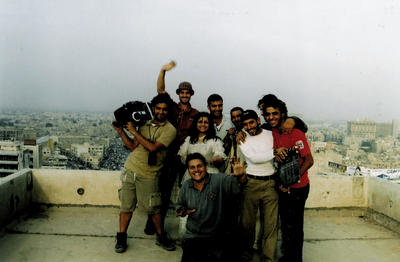 And the hospital officer after a while brought the militia, and this milita kidnapped us from the hospital again, and put us in the crematorium and beat us very hard and very tough, and this militia, worked in an unofficial title with the American army, and then the American army arrived and was accusing us, saying we were making a properganda film for Al Qaeda, after they had been very heavy interrogating us. And they sent us to to a heavy prison, a terror prison in the green zone are where the UK and US embasey were. We spent six days there and then the Dutch embasy took me out of the prison with the rest of the crew, after the Americans couldn't find anything to say I was making a properganda film for Al Qaeda. Which was what they were accusing me for.
And the hospital officer after a while brought the militia, and this milita kidnapped us from the hospital again, and put us in the crematorium and beat us very hard and very tough, and this militia, worked in an unofficial title with the American army, and then the American army arrived and was accusing us, saying we were making a properganda film for Al Qaeda, after they had been very heavy interrogating us. And they sent us to to a heavy prison, a terror prison in the green zone are where the UK and US embasey were. We spent six days there and then the Dutch embasy took me out of the prison with the rest of the crew, after the Americans couldn't find anything to say I was making a properganda film for Al Qaeda. Which was what they were accusing me for.
And then the American army arrived and was accusing us, saying we were
making a properganda film for Al Qaeda, after they had been very heavy
interrogating us. And they sent us to to a heavy prison, a terror
prison in the green zoneAt any point did you think about giving up or shooting in another country?
Yes, during that there were some times I was thinking that. You know, you sometimes get scared and frightened for your life. And you're responsible for other people, this is not something easy, so I was really scared. But I never thought about shooting outside of Iraq. Because of the feeling, the environment, there is some sort of smell of Iraqi culture around Bagdhad, all this thing, probably I could not have made it in another country, this is why I chose to shoot it in Iraq.
It wouldn't have the same impact. That's why in my next film I will go back and shoot my next film in Iraq
I assume every day there was some kind of tension as to what might happen?
Every day there was some tension. There was always some problems with either the Americans or the Iraqi police. There's always some problems.
And what was the reaction of the locals?
The locals at the beginning, they don't like it, they thought it was weird. But then when they see me, when they see how professional we are, with the crew around me and see that we are behaving as professionals. Then they start to like it and then they started to help me, because sometimes I needed their help in the area where I set up my scenes. In the beginning it was difficult to convince them, but when they see how we behave.
How long was the shoot for?
It started from the last week of September 21st 2004 - ended on the 31st December..
We got 140 rejections from funding organisations in Europe and UK.
Screen Yorkshire, they rejected me twice. The Film Council, they
rejected me. A lot of oganisations they rejected meCan you tell me how you got the film funded?
It started with zero. nobody would fund me. Actually we got 140 rejections from funding organisations in Europe and UK. Screen Yorkshire, they rejected me twice. The Film Council, they rejected me. A lot of oganisations they rejected me.
But this organisation called Hebros in Holland, they gave me some small small funds to begin with at the beginning of the film, and then when I finished shooting the film in Bagdhad, I went to Rotterdam, they have a special fund for developing country filmmakers, and they funded me to make the prints and everything. Unlike Screen Yorkshire or UK Film Council, they rejected me.
Has there been any support from UK agencies?
No that's the strange thing there's been no support from the UK. You'd expect the UK to support you.
What about with the Oscar campaign? The flights to LA?
Nothing, it makes me angry, makes me angry, my team angry. You expect from Screen Yorkshire, to help you with the Oscar. And you go to Los Angeles, you're not asking for lots of money. And they don't fund you. And they give a ridiculous amount of money for stupid films (famously Garfield II - ed), and films not made by Yorkshire companies or anything like that, or not in Yorkshire area or not post production in Yorkshire. Films made by companies just based in name in yorkshire, and everything goes down to London, a lot of money.
It's crazy.
What about the British Council, their festivals department?
No nothing.
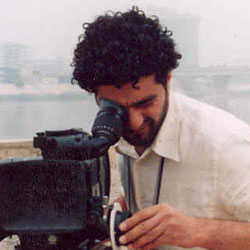 It's admirable that you're still pushing this film forward and the next one. I imaginge it's only a matter of time before they..
It's admirable that you're still pushing this film forward and the next one. I imaginge it's only a matter of time before they..
Absolutely
What was the budget in the end?
The budget was around £300,000. A low budget film.
Most of the cast and crew were defered payment?
Yup.
And how long from finishing it to final print?
I started with the idea and the script around May 2003. And finished it in January 2006. So around two and a half year. Around 2004/05. But we're still working on it as a producer and a production company. You never stop it, as you know. Trying to market it. Until now i've been promoting the film and trying to distribute the film.
What about Leeds Met Film School?
They were behind me 100%. The film school and Leeds Met, they were behind me 100%. They tried to help me with any sorts of facilitiy. Without their support I couldn't make this film. The preproduction when I was in the UK, they helped with, then the post production they also helped.
Can you give me an idea about Human Film, what the thinking is as a produciton company?
We are to make films, feature films and documentaries about culture, about human messages and issues. It's about the cross of cultures between the west and the east. It's about human stories.
How much do you think the 'terror threat' and the problems in Iraq are made worse by Hollywood films where the issues are presented so simplistically and black and white?
A lot, this is why we made the film. And when I see the reaction to the film in the US, and how people appreciate it, it's so encouraging for you because people develop a different point of view about the Iraqi people. How the Iraqi people change from being just a number used by the media as a way to fill out the news or political show become a normal human being, we all suffer.
Absolutely, that's exactly what I felt and the people I watched it with felt. What has the reaction been like in festivals?
Amazing. It's been amazing. It's won 16 awards. Any festival the film has been shown, it's been the talk of the festival.
At the end of the day, what is religion but about human beings learning
to live in peace. What Islam, Christian and Jewish religions say is
the same. The commandments: don't kill, don't kill, don't steal,
don't lie, dont talk about people - religion is about human beings. All
the religions are the same...
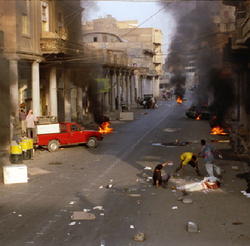 What do you think a filmmaker - someone working in the UK - what do you think they can or should do about what's going on in Iraq?
What do you think a filmmaker - someone working in the UK - what do you think they can or should do about what's going on in Iraq?
To be honest it's not just about Iraq, there's a lot of human stories around the world that we need to tell and learn from. For me film's not just enteratinment, film is a big message, film makes you think. Of course we need to entertain people, but not just to entertain people and let them watch something for two hours and then let them go home and forget everything. Film is not about that for me, film is not a circus. Film is about more for me a message that they tell you, to inform people about what's going on, to show people what's happened, to change the mind of people when they vote and elect because they will remember certain films, and that is very important for me.
There are a lot of stories in the world, in Africa and China and Asia, and all the countries where you have these problems, Iraq, the Middle East, Israel, and all these dictatorships around the world.
How can people support Human Film?
Just contact us. Or call the office.
I'd love to ask you more about the production - is there anything that you feel I've missed?
What I would say is that I wish that we can carry on with our films and we hope that we can one day cover our finance, our cover for the next projects for my company, and with my team. I believe very strongly we will make it as soon as possible, I am very optimistic, for the future of my country, for the future of making films, for Human films.
Am I right in thinking that the company is made up of a Christian, Isabelle is partly Jewish, and you're Muslim?
To be honest we don't put religion in there. But I am Muslim. Danny, he is with me, he is Christian. Isabelle is half Jewish. And we never think about religion, at the end of the day, what is religion but about human beings learning to live in peace. What Islam , Christian and Jewish religions say is the same. The ten commandments: don't kill, don't kill, don't steal, don't lie, dont talk about people - religion is about human beings.
All the religions are the same. So when my friend Danny goes on Sunday to the church and prays to God and when I go on Friday to the Mosque, and on Saturday she goes to the synagogue it's the same thing. We don't have any problems.
Religion is for you, not for me. Religion is something private, it's about you and your God. You respect me I respect you, we live together this fantastic life. This is why God made us different, if he made us the same with one religion, it would make life boring, that's why he made us different: white, black, yellow, brown.
Release details
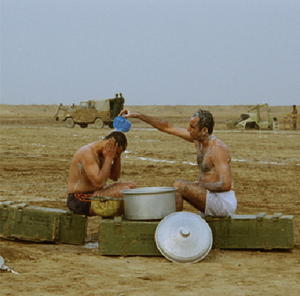 Ahlaam is released in the UK 2nd November starting at the ICA London, for 7 nights. A Q&A with Mohamed takes place on the 2nd. Other screenings so far scheduled include:
Ahlaam is released in the UK 2nd November starting at the ICA London, for 7 nights. A Q&A with Mohamed takes place on the 2nd. Other screenings so far scheduled include:
- Hawkhurst Kino - , from 2nd November for 7 nights
- Sevenoaks Kino - from 2nd November for 7 nights
- Bradford Pictureville - from 23rd November for 7 nights
- Chichester New Park - from 1st December for two nights
- Edinburgh Film House - from 7th December with Q&A for four nights
- Aberystwyth Arts Centre - from 8th December for three nights
- Inverness Eden Court - from 20th Feb 2008 for two nights
Further screenings planned for Brixton Ritzy, Cardiff Chapter, Leeds, Dundee DCA and more - watch this space.
More info on the film at www.ahlaamthemovie.com and Human Film via their website.